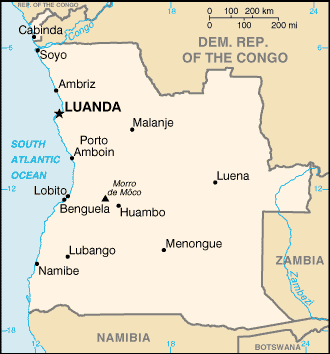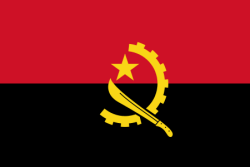Angola
Related Categories:
 Symbols of The Republic of Angola
Symbols of The Republic of AngolaThe cog wheel, the machete and the star shall be yellow, symbolizing the country's wealth.
www.angola.org.uk/
Description of the flag, Coat of Arms, Presidential flag.
www.fotw.us/
Angola's motto is "Virtus Unita Fortior", a Latin phrase meaning "Virtue is stronger when united."
en.wikipedia.org/
Estimates of Angola’s population vary widely, as there has been no census for many years, but it is estimated at no less than 13 million. Angola has three main ethnic groups, each speaking a Bantu language: Ovimbundu 37%, Kimbundu 25%, and Bakongo 13%. Other groups include Chokwe, Lunda, Ganguela, Nhaneca-Humbe, Ambo, Herero, and Xindunga. In addition, mixed racial (European and African) people amount to about 2%, with a small (1%) population of whites, mainly ethnically Portuguese. Portuguese make up the largest non-Angolan population, with at least 30,000 (though many native-born Angolans can claim Portuguese nationality under Portuguese law). Portuguese is both the official and predominant language.
www.state.gov/r/
Introduction
About
Contact
Symbols in The News
Interpret this Symbol
AAC
African
AI
Alchemy
Alphabets
Ancient
Animal Symbolism
Architecture
Art
Articles
Astrology
Baha'i
Blissymbolics
Blueprint Symbols
Buddhist
Celtic Symbols
Cemetery
Chinese Symbols
Christian
Circle
City
Codes
Color
Conlangs
Crop Circles
Danger
Da Vinci Code
Designing Logos
Dictionaries
Dreams
Education
Egyptian Symbols
Electrical
Emoticons
Find Images
Fonts
Food
Fraternity
Hamsa
Healing
Heraldry
Hermetic
Highway Signs
Hindu
History
Hobo
Holiday
Icons
iConji
Islamic
Jain Symbols
Japanese, Kanji
Jewish
Justice
Law
Literary Symbolism
Mandalas
Map
Masonic
Math, Number
Meaning of Names
Medical
Middle East
Military
Miscellaneous
Money
Music
Mythology
Native American
Playing Cards
Power
Psychology
QiQiiKhu
Reiki
Religious
Runes, Norse
Sacred Geometry
Scientific
Science Fiction
Sorority
Sports
Symbols in the News
Tattoos
ThirteenSymbols
Tree of Life
Ursprache
Videos
Visual Languages
Weather
Web Codes
Wicca
Words
Writing Systems
Braille
Coinherence
Coptic
Cuneiform
Easter Island
Etruscan
Happy Human
Hebrew
Kokopelli
Linear B
Lotus
Love Symbols
Mandorla
Moon Alphabet
Nine Pointed Star
Om
Oz
Phonetic
Scarab Beetle
Silent
Theosophy
Unifon
About
Contact
Symbols in The News
Interpret this Symbol
AAC
African
AI
Alchemy
Alphabets
Ancient
Animal Symbolism
Architecture
Art
Articles
Astrology
Baha'i
Blissymbolics
Blueprint Symbols
Buddhist
Celtic Symbols
Cemetery
Chinese Symbols
Christian
Circle
City
Codes
Color
Conlangs
Crop Circles
Danger
Da Vinci Code
Designing Logos
Dictionaries
Dreams
Education
Egyptian Symbols
Electrical
Emoticons
Find Images
Fonts
Food
Fraternity
Hamsa
Healing
Heraldry
Hermetic
Highway Signs
Hindu
History
Hobo
Holiday
Icons
iConji
Islamic
Jain Symbols
Japanese, Kanji
Jewish
Justice
Law
Literary Symbolism
Mandalas
Map
Masonic
Math, Number
Meaning of Names
Medical
Middle East
Military
Miscellaneous
Money
Music
Mythology
Native American
Playing Cards
Power
Psychology
QiQiiKhu
Reiki
Religious
Runes, Norse
Sacred Geometry
Scientific
Science Fiction
Sorority
Sports
Symbols in the News
Tattoos
ThirteenSymbols
Tree of Life
Ursprache
Videos
Visual Languages
Weather
Web Codes
Wicca
Words
Writing Systems
Braille
Coinherence
Coptic
Cuneiform
Easter Island
Etruscan
Happy Human
Hebrew
Kokopelli
Linear B
Lotus
Love Symbols
Mandorla
Moon Alphabet
Nine Pointed Star
Om
Oz
Phonetic
Scarab Beetle
Silent
Theosophy
Unifon

